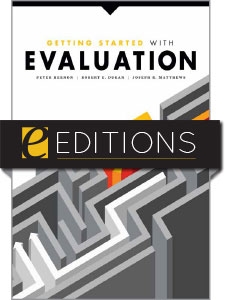
Getting Started with Evaluation—eEditions e-book
The download link for this product can be found on the final confirmation screen after you complete your purchase, and may also be accessed from your Account Profile. For more information about ALA eEditions file types and how to view them on eReaders, desktop computers, and other devices, see this page.
Primary tabs
You don't need to be an ALA Member to purchase from the ALA Store, but you'll be asked to create an online account/profile during the checkout to proceed. This Web Account is for both Members and non-Members.
If you are Tax-Exempt, please verify that your account is currently set up as exempt before placing your order, as our new fulfillment center will need current documentation. Learn how to verify here.
- Description
- Table of Contents
- About the authors
- Reviews
Everyone agrees that evaluation of library services is essential, but without a background in research it can be a challenge to apply abstract concepts such as strategic planning, evidence-based decision making, and accountability to real-world situations. Finally library managers have a workbook to help them master key concepts of service quality assessment, offering directed exercises and worksheets to guide them. Firmly rooted in practical application, this book
- Presents an overview of evaluation and the types of metrics, linking them to strategic planning and infrastructure
- Examines qualitative versus quantitative measures
- Shows how to decide which metrics are relevant to one's own institution, covering benchmarking, best practices, peer group filters, and those metrics that offer a high return on investment
- Includes pointers for launching and maintaining successful library evaluation through flexibility and smart delegation among library staff
- Offers advice on marshaling data to effectively communicate the value and impact of a library and its services, no matter the audience
Complete with a detailed list of sources for metrics and concrete examples of evaluation in practice, this workbook will be both valuable and immediately useful to managers at academic and public libraries, as well as to library trustees and others interested in assessing service quality.
Preface 1 Evaluation2 Evidence-Based Planning and Decision Making3 Library Metrics4 Internal Evaluation for Planning and Decision Making5 External Evaluation to Inform Stakeholders and to Guide Continuous Improvement6 Measuring Satisfaction7 Measuring Service Quality8 Measuring Return on Investment (ROI)9 Measuring the Value of the Library and Its Services10 Using and Communicating the Results11 Positive Organizational Change Selected ReadingsAbout the AuthorsIndex
Peter Hernon
Peter Hernon is a professor emeritus at Simmons College, Boston, and was the principal (and founding) faculty member for the doctoral program, Managerial Leadership in the Information Professions. He received his PhD degree from Indiana University, Bloomington, and was the 2008 recipient of the Association of College and Research Libraries' award for Academic/Research Librarian of the Year, the founding editor of Government Information Quarterly, and past editor-in- chief of The Journal of Academic Librarianship. He is the coeditor of Library & Information Science Research and has taught, conducted workshops, and delivered addresses in eleven countries outside the United States. He is the author or co-author of 57 books, including the award-winning Federal Information Policies in the 1980s (1985) and Viewing Library Metrics from Different Perspectives (2009).
Robert E. Dugan
Robert E. Dugan is director of the Mildred F. Sawyer Library at Suffolk University in Boston. He has worked in libraries for more than 27 years serving as associate university librarian, state librarian, public library director, and reference librarian. Dugan is the author of more than 40 articles on information policy and the use of technology and has coauthored two books, including U.S. Government on the Web.
Joseph R. Matthews
Joseph R. Matthews is a consultant specializing in strategic planning, assessment, evaluation of library services, customer service, use of performance measures, and the balanced scorecard. He was an instructor at the San Jose State University School of Library and Information Science. He is author of The Customer-Focused Library, The Evaluation and Measurement of Library Services, Scorecards for Results, Strategic Planning and Management for Managers, and Measuring for Results, and the coauthor (with Peter Hernon) of Listening to the Customer, among other books.
"A useful introduction to the topic of evaluation that provides many resources for library managers. There are many tables and figures throughout the book, as well as references and useful exercises at the end of each chapter. The exercises make this potentially useful in a classroom setting."
— Catholic Library World
"Hernon, Dugan, and Matthews inspire readers to collect data to inform decision making whenever possible, and Getting Started with Evaluation provides the means to get started right away."
— Library Resources & Technical Services
"This is the book that you absolutely must have if you are required to evaluate a library service and your librarianship education did not touch on research methods or statistics. Although titled Getting Started, this work it does much more than ‘get started'. It takes the reader step-by-step through the whole process, from the introduction of basic terminology to the final presentation of results – and quickly too, in a compact 242 well-written pages."
— Australian Library Journal
"The solutions offered by Hernon, Dugan, and Matthews focus on existing, well-established best practices … for those just beginning to learn about assessment or embarking on a new evaluation program for their institution, this book offers a valuable entry point into the field."
— Journal of Library Innovation
"This book is a fine summary of what we as librarians have come to understand about evaluation. It is well written and would make a fine textbook for a class in library assessment, offering good suggestions for data collection and good summaries of prevailing concepts."
— Technical Services Quarterly


